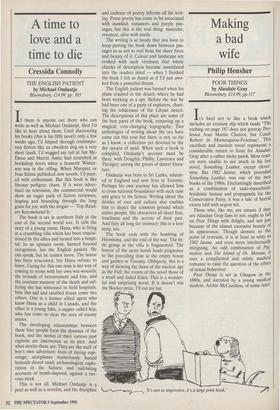A time to love and a time to die
Cressida Connolly
THE ENGLISH PATIENT by Michael Ondaatje Bloomsbury, £14.99, pp. 303 If there is anyone out there who can write as well as Michael Ondaatje, then I'd like to hear about them. Until discovering his books (this is his fifth novel) only a few weeks ago, I'd limped through contempo- rary fiction like an obedient dog on a very short leash. I'd wagged my tail at Ian Mc- Ewan and Martin Amis; had scratched at bookshop doors when a Jeanette Winter- son was in the offing. When Marquez or Ivan Klima published new novels, I'd pant- ed with enthusiasm. But this book is like literary pedigree chum. If it were adver- tised on television, the commercial would show an eager pack of fiction reviewers, leaping and bounding through the long grass for joy; with the slogan — 'Top Read- ers Recommend It.'
The book is set in northern Italy at the end of the second world war. It tells the story of a young nurse, Hana, who is living in a crumbling villa which has been requisi- tioned by the allies and turned into a hospi- tal. In an upstairs room, burned beyond recognition, lies the English patient. He can speak, but he cannot move. The house has been evacuated, but Hana refuses to leave. Caring for this one man is her way of coming to terms with her own war-wounds; the wounds of bereavement and loss, and the constant memory of the death and suf- fering she has witnessed in field hospitals. Into this sad and rarefied house come two others. One is a former allied agent who knew Hana as a child in Canada, and the other is a young Sikh, a sapper called Kip, who has come to clear the area of enemy mines.
The developing relationships between these four people form the dynamic of the book, and the stories of their various past exploits are interwoven as its plot. And what stories these are. They are the stuff of boy's own adventure: feats of daring espi- onage; aeroplanes mysteriously buried beneath desert sand; archaeological explo- ration in the Sahara; and nail-biting accounts of bomb-disposal, against a ner- vous clock.
This is not all. Michael Ondaatje is a poet as well as a novelist, and the discipline and cadence of poetry informs all his writ- ing. Prose-poetry has come to be associated with mawkish romances and purple pas- sages, but this is the real thing: muscular, resonant, alive with simile.
The writing is so heady that you have to keep putting the book down between pas- sages so as not to reel from the sheer force and beauty of it. Colour and landscape are evoked with such vividness that whole chunks of description become assimilated into the readers mind — when I finished the book I felt as dazed as if I'd just awo- ken from a powerful dream.
The English patient was burned when his plane crashed in the desert, where he had been working as a spy. Before the war he had been one of a party of explorers, chart- ing the wilderness of the Libyan desert. The descriptions of this place are some of the best parts of the book, conjuring up a magical, ever-changing topography. Two anthologies of writing about the sea have come out this year but there is not, so far as I know, a collection yet devoted to the dry oceans of sand. When such a book is compiled, Ondaatje's account must be there, with Doughty, Philby, Lawrence and Thesiger; among the greats of desert litera- ture.
Ondaatje was born in Sri Lanka, educat- ed in England and now lives in Toronto. Perhaps his own journey has allowed him to cross national boundaries with such ease and grace in his fiction. Writing about the divides of race and culture also enables him to depict the common ground which unites people. His characters all share fear, loneliness and the secrets of their past. And they all long for intimacy: this is a love story, too.
The book ends with the bombing of Hiroshima, and the end of the war. The lit- tle group at the villa is fragmented. The horror of the atom bomb lends poignance to the preceding time at the empty house and garden in Tuscany. Obliquely, this is a way of showing the dawn of the nuclear age as the Fall; the events of the novel those of a small and faded Eden. This is a wonder- ful and surprising novel. If it doesn't win the Booker prize, I'll eat my hat.


















































 Previous page
Previous page